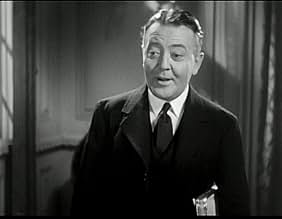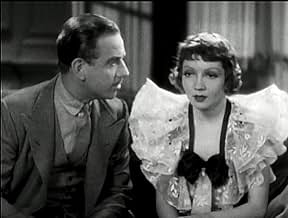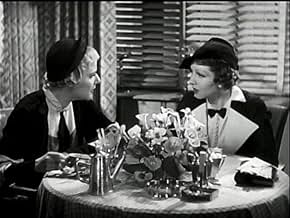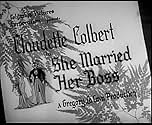IMDb RATING
6.5/10
775
YOUR RATING
An efficient secretary at a department store marries her boss, but discovers that taking care of him at home is a lot different to taking care of him at work.An efficient secretary at a department store marries her boss, but discovers that taking care of him at home is a lot different to taking care of him at work.An efficient secretary at a department store marries her boss, but discovers that taking care of him at home is a lot different to taking care of him at work.
- Director
- Writers
- Stars
- Awards
- 1 win total
Grace Hayle
- Agnes Mayo
- (as Grace Hale)
Ernie Adams
- Passerby
- (uncredited)
William Arnold
- Department Head
- (uncredited)
Lynton Brent
- Assistant Window Dresser
- (uncredited)
Edmund Burns
- Newspaper Photographer
- (uncredited)
A.S. 'Pop' Byron
- Store Watchman
- (uncredited)
- Director
- Writers
- All cast & crew
- Production, box office & more at IMDbPro
Featured reviews
Most modern viewers of 1930's comedies will be accustomed to the necessity of suspending disbelief and modern sensibilities to entirely enjoy these films. However, She Married Her Boss contains one or two scenes which make this a difficult task. The main problematic scene is the drunk driving scene which is sufficiently reckless as to be just plain alarming to modern audiences but fortunately occurs at the end of the movie so as not to be troubling throughout. The second such scene however is the (aural) scene of Julia (Claudette Colbert) spanking Anabelle several times with a hairbrush. In modern times, with the idea of physically punishing children being so controversial, this scene refuses to simply fade into the background of the film and become simply a comedic scene and lingers in a slight feeling of unease in watching the remainder of the film despite Annabelle's growing affection for Julia. Simliarly Julia's friends taunts of Annabelle appear somewhat cruel; being adults ganging up on an unhappy child, no matter how obnoxious her behaviour.
Although some of the comedic aspects of the film may not translate to a modern audience, the film nevertheless contains some gems of serious scenes - Claudette Colbert's reaction to her husband mocking her for behaving like a woman and his criticism that she is making their marriage "just like any other marriage". Similarly the shop dummy scene can be enjoyed on a number of levels, the drunken comedy is delightful but also wonderful is Colbert's pained expression and declaration that "Julia doesn't live here anymore". Finally my favourite scene of the film, when Melvyn Douglass confronts Colbert after her antics in the shop window appear in the press, effectively calling her "second hand goods". Colberts reactions from resignation, to pride to hurt to confrontation are a pure acting lesson.
While some of the comedy may struggle to appeal to modern audiences, the scene of the new bride (Colbert) being carried over the thresh-hold by her new husband's butler remains one of the funniest moments in 1930's comedy and Julia's kicking of the child shop dummy (surely a reaction to her troubled step-daughter) remains a guilty pleasure so that despite some reservations the film continues to work on both the dramatic and comedic levels despite some need to be prepared more than usual to put modern considerations aside to entirely enjoy this.
Although some of the comedic aspects of the film may not translate to a modern audience, the film nevertheless contains some gems of serious scenes - Claudette Colbert's reaction to her husband mocking her for behaving like a woman and his criticism that she is making their marriage "just like any other marriage". Similarly the shop dummy scene can be enjoyed on a number of levels, the drunken comedy is delightful but also wonderful is Colbert's pained expression and declaration that "Julia doesn't live here anymore". Finally my favourite scene of the film, when Melvyn Douglass confronts Colbert after her antics in the shop window appear in the press, effectively calling her "second hand goods". Colberts reactions from resignation, to pride to hurt to confrontation are a pure acting lesson.
While some of the comedy may struggle to appeal to modern audiences, the scene of the new bride (Colbert) being carried over the thresh-hold by her new husband's butler remains one of the funniest moments in 1930's comedy and Julia's kicking of the child shop dummy (surely a reaction to her troubled step-daughter) remains a guilty pleasure so that despite some reservations the film continues to work on both the dramatic and comedic levels despite some need to be prepared more than usual to put modern considerations aside to entirely enjoy this.
First, I must respectfully disagree with one reviewer here who kept describing the film as a screwball comedy. Even in the 1930s, every comedy was not a screwball comedy, and this isn't one (despite one kinda goofy car episode). It's not a drawing room comedy either. It's simply a domestic comedy...in fact, is it really a comedy. Let's see, you have an obsessive boss that has no real personal life, a sister that's a terrible prude and suppresses any family joy in life, a young daughter who is so unhappy that she's become a terrible brat, a young lady (Colbert)who has her eyes on her boss but then finds herself in an unsatisfying marriage, and a little girl who then pines because the stepmother who has brought some joy into her life then leaves home. In many ways, this is a pretty serious story -- with some comedic moments.
Several reviewers have wondered why the Colbert character is interested in the Melvyn Douglas boss character to begin with. A fair criticism. The screenwriters and director sure haven't given us much of a clue about that. But how many of us have found ourselves in an unfulfilling relationship or marriage, ultimately realizing we made a mistake. And I tried to remember that this film was made in 1935. Films were not always very sophisticated back then...they were slowly growing up...and the story here is certainly more sophisticated than many other films from the same time.
Claudette Colbert is quite good here, though obviously not quite as well developed as an actress as she was in the 1940s. Melvyn Douglas was good in the role he played, although it's rather hard to like that role. Two standout performances were 12-year-old Edith Fellows as Douglas' bratty daughter (who develops into a rather nice child once the home situation improves), and Raymond Walburn as Douglas' butler (the scenes of Douglas and Walburn in a drunken state were among the better drunk scenes I've seen).
If you see this movie for what it is -- a drama story with comedy overtones -- you'll really enjoy it. It's far better than many other mid-30s productions...and 1939 was just around the corner.
Several reviewers have wondered why the Colbert character is interested in the Melvyn Douglas boss character to begin with. A fair criticism. The screenwriters and director sure haven't given us much of a clue about that. But how many of us have found ourselves in an unfulfilling relationship or marriage, ultimately realizing we made a mistake. And I tried to remember that this film was made in 1935. Films were not always very sophisticated back then...they were slowly growing up...and the story here is certainly more sophisticated than many other films from the same time.
Claudette Colbert is quite good here, though obviously not quite as well developed as an actress as she was in the 1940s. Melvyn Douglas was good in the role he played, although it's rather hard to like that role. Two standout performances were 12-year-old Edith Fellows as Douglas' bratty daughter (who develops into a rather nice child once the home situation improves), and Raymond Walburn as Douglas' butler (the scenes of Douglas and Walburn in a drunken state were among the better drunk scenes I've seen).
If you see this movie for what it is -- a drama story with comedy overtones -- you'll really enjoy it. It's far better than many other mid-30s productions...and 1939 was just around the corner.
Terribly uneven mix of comedy and romantic drama, the script of SHE MARRIED HER BOSS is unworthy of the talents assembled to interpret it. The always reliable Claudette Colbert has to contend with lines like: "Marriage is a woman's real career," as a woman secretly in love with her boss for six years. MELVYN DOUGLAS is the boss, but his part his so poorly written that you have to wonder what Colbert ever sees in him. Nevertheless, he plays it with a flair for this sort of inane comedy.
JEAN DIXON as Colbert's friend and KATHERINE Alexander as Douglas' snooty sister are just cardboard cutouts. And poor EDITH FELLOWS has to play the most insufferable brat since Bonita Granville's turn in THE CHILDREN'S HOUR.
There are various lapses of taste throughout (from today's viewpoint), and the costumes are really the most unflattering female designs ever worn by Colbert in any of her early films. You have to yearn for the Colbert of the '40s (so smartly sophisticated) because she looks downright dowdy in most of her odd wardrobe choices. As I say above, dated in more ways than one.
Not recommended.
JEAN DIXON as Colbert's friend and KATHERINE Alexander as Douglas' snooty sister are just cardboard cutouts. And poor EDITH FELLOWS has to play the most insufferable brat since Bonita Granville's turn in THE CHILDREN'S HOUR.
There are various lapses of taste throughout (from today's viewpoint), and the costumes are really the most unflattering female designs ever worn by Colbert in any of her early films. You have to yearn for the Colbert of the '40s (so smartly sophisticated) because she looks downright dowdy in most of her odd wardrobe choices. As I say above, dated in more ways than one.
Not recommended.
Executive secretary marries her (presumably divorced) boss, a department store magnate, and tries making a home for them both and his bratty nine-year-old daughter; the trouble is, he thought he married a savvy, sharp businesswoman, not a "flouncy, coy" housewife. Interesting depiction of a woman's role in the workplace--circa 1935--vis-à-vis her role as a wife and stepmother. Some of the high society patter is fast and fresh, but when the moviemakers get maudlin, the picture goes down the drain. Claudette Colbert gives a good performance, though Melvyn Douglas gets stuck with the worst of it (walking in on family frivolity with a scowl, misunderstanding a compromising photo of his wife in the newspaper, getting drunk along with the butler, etc.). Sassy Edith Fellows gives it a goose until she, too, is reduced to hysterics. ** from ****
Claudette Colbert and Melvyn Douglas star in "She Married Her Boss," a 1935 comedy also starring Edith Fellows and Jean Dixon.
This is a very dated comedy including a wife having to leave her career when she gets married, drunk driving, and child abuse - all things that are pretty much out now. Sometimes it's hard, but the only way to get anything out of these movies is to take them for what they were - done at a specific time when society mores were different. Some of it, however, has to do with the censors, particularly the career woman part, and there really wasn't any need for it. Interesting to me that the censors were very careful to push the nonworking mom but okayed spanking a kid with a hairbrush and drunk driving.
Claudette Colbert is Julia Scott, an efficient assistant at a department store, taking care of a huge office for her boss Richard Barclay (Melvyn Douglas). Julia isn't happy - her idea of a real career would be to marry her boss, with whom she's been in love for six years. She gets her wish, and his darling daughter (Fellows) along with it.
Julia finds that Barclay's home is a mess, and sets about putting it in order. Bonding with his daughter is going to take more, however, than mere efficiency. The kid's a brat. And Barclay's sister, who's used to having things her own way, is no party either.
Colbert is fabulous, and Douglas, one of the great actors, doesn't infuse a terrible part with much warmth. His character isn't very likable, and one never feels that this is a truly married and in love couple. I don't really blame Douglas - the role is badly written, to go along with some of the script. The supporting actors are all excellent, including the aforementioned, Katherine Alexander as Barclay's sister and Raymond Walburn as the butler.
There are some very good scenes, and the film is definitely worth it for Colbert - and a look at how far we've come in some arenas.
This is a very dated comedy including a wife having to leave her career when she gets married, drunk driving, and child abuse - all things that are pretty much out now. Sometimes it's hard, but the only way to get anything out of these movies is to take them for what they were - done at a specific time when society mores were different. Some of it, however, has to do with the censors, particularly the career woman part, and there really wasn't any need for it. Interesting to me that the censors were very careful to push the nonworking mom but okayed spanking a kid with a hairbrush and drunk driving.
Claudette Colbert is Julia Scott, an efficient assistant at a department store, taking care of a huge office for her boss Richard Barclay (Melvyn Douglas). Julia isn't happy - her idea of a real career would be to marry her boss, with whom she's been in love for six years. She gets her wish, and his darling daughter (Fellows) along with it.
Julia finds that Barclay's home is a mess, and sets about putting it in order. Bonding with his daughter is going to take more, however, than mere efficiency. The kid's a brat. And Barclay's sister, who's used to having things her own way, is no party either.
Colbert is fabulous, and Douglas, one of the great actors, doesn't infuse a terrible part with much warmth. His character isn't very likable, and one never feels that this is a truly married and in love couple. I don't really blame Douglas - the role is badly written, to go along with some of the script. The supporting actors are all excellent, including the aforementioned, Katherine Alexander as Barclay's sister and Raymond Walburn as the butler.
There are some very good scenes, and the film is definitely worth it for Colbert - and a look at how far we've come in some arenas.
Did you know
- TriviaThe beginning theme music is the same as the 1934 movie It Happened One Night.
- Quotes
Julia Scott: This is Grandma Scott. She knitted the Dred Scott decision on a piece of old burlap.
Details
- Release date
- Country of origin
- Language
- Also known as
- She Married Her Boss
- Production company
- See more company credits at IMDbPro
- Runtime
- 1h 25m(85 min)
- Color
- Aspect ratio
- 1.37 : 1
Contribute to this page
Suggest an edit or add missing content



































